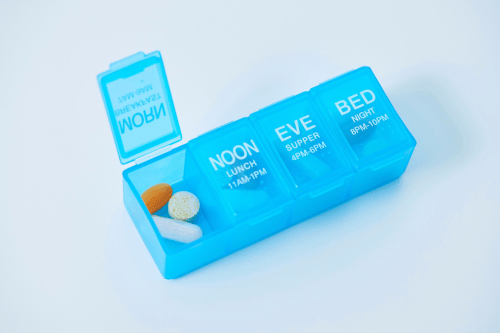Focalin vs Adderall: Differences, Benefits, and Risks
Attention-Deficit/Hyperactivity Disorder (ADHD) is a chronic condition that affects focus, impulse control, and daily activities. Prescription medications like Focalin and Adderall are commonly used to manage ADHD-related symptoms. These stimulant medications belong to a class of drugs called central nervous system stimulants and work by increasing neurotransmitter activity in the brain. This guide compares Focalin vs. Adderall, covering their mechanism of action, effectiveness, potential side effects, dosage forms, and risk of misuse.
What Are Focalin and Adderall?
Both Focalin and Adderall are prescription drugs used for ADHD treatment. They are available in immediate-release and extended-release forms, providing different durations of symptom relief.
Composition of Focalin
Focalin contains dexmethylphenidate, the active form of methylphenidate. This refined version is more potent, requiring a lower dose compared to traditional methylphenidate-based medications.
Composition of Adderall
Adderall contains a combination of amphetamine salts, including amphetamine sulfate and mixed amphetamine salts. These compounds enhance dopamine and norepinephrine levels in the brain, improving attention span and impulse control.

Mechanism of Action
Both medications affect neurotransmitter activity, but they work in slightly different ways.
How Focalin Works
Focalin blocks the reuptake of norepinephrine and dopamine, increasing their availability in the brain. This helps improve focus, impulse control, and attention span.
How Adderall Works
Adderall increases the release of dopamine and norepinephrine while also preventing their reabsorption. This combination of amphetamine salts results in a more potent stimulant effect.
Primary Uses
Focalin for ADHD Management
Focalin is prescribed for ADHD in both children and adults. It is preferred by some healthcare providers for its shorter duration and reduced side effects in certain patients.
Adderall for ADHD Management
Adderall is commonly prescribed due to its long-acting medication options. It is also used to treat bipolar disorder and other mental health conditions when deemed appropriate by a healthcare professional.
Efficacy in Managing ADHD Symptoms
Focalin’s Effectiveness
Focalin helps improve attention span, impulse control, and daily routine. It is often well-tolerated but may cause loss of appetite and abdominal pain in some users.
Adderall’s Effectiveness
Adderall provides strong symptom relief due to its dual action on neurotransmitters. Patients may experience increased focus, reduced impulsivity, and better overall functioning in their daily activities.
Duration of Effect
The duration of action for each medication depends on whether it is immediate-release (IR) or extended-release (XR).
Focalin’s Duration of Action
- Focalin IR: Lasts 4-6 hours per dose
- Focalin XR: Lasts up to 12 hours
Adderall’s Duration of Action
- Immediate-release Adderall (Adderall IR): Lasts 4-6 hours per dose
- Adderall XR (Extended-release capsules): Lasts up to 12 hours

Dosage Forms
Both medications are available in immediate-release tablets and extended-release forms.
Immediate Release vs. Extended Release for Focalin
- Immediate-release tablet (Focalin IR): Requires multiple doses times per day
- Extended-release tablets (Focalin XR): Provides long-acting medication benefits with a single dose
Immediate Release vs. Extended Release for Adderall
- Immediate-release Adderall (Adderall IR): Requires dosing multiple times per day
- Adderall XR (Extended-release medication): Lasts longer, reducing the need for frequent dosing
Side Effects
Like all prescription medication, both Focalin and Adderall have potential side effects.
Common Side Effects of Focalin
- Loss of appetite
- Weight loss
- Stomach pain
- Sore throat
- Daytime sleepiness
Serious Side Effects of Focalin
- Chest pain
- Heart palpitations
- Severe side effects like sudden death in individuals with a history of heart problems
Common Side Effects of Adderall
- Appetite suppression
- Nausea
- Shortness of breath
- Increased heart rate
Serious Side Effects of Adderall
- Heart attack in individuals with heart disease
- Dependency warning due to the risk of addiction and potential for misuse
- Painful erections
Risks of Misuse and Dependence
Both medications have a risk of abuse and risk of dependence, especially in individuals without ADHD.
Misuse Potential of Focalin
Focalin can be abused for cognitive enhancement, leading to physical dependence and withdrawal symptoms.
Misuse Potential of Adderall
Adderall carries a higher risk of misuse due to its strong stimulant effects. Black box warnings highlight the potential for abuse and the dangers of long-term use without medical supervision.
Drug Interactions
Interactions of Focalin
- Selective serotonin reuptake inhibitors (SSRIs) and serotonin-norepinephrine reuptake inhibitors (SNRIs): Increased potential risk of serotonin syndrome
- Blood pressure medications: Can cause unpredictable changes in blood pressure
Interactions of Adderall
- Monoamine oxidase inhibitors (MAOIs): Dangerous drug interactions that can cause life-threatening symptoms
- Proton pump inhibitors: May alter absorption of extended-release versions
Cost and Insurance Coverage
Price Comparison of Focalin and Adderall
- Focalin: The brand-name drug is often more expensive, but the generic form is available.
- Adderall: More affordable due to widespread generic version availability.
Insurance Considerations for Focalin and Adderall
- Insurance plans typically cover both, but insurance provider policies may vary.
- Discount card and discount programs are available for patients with limited health insurance coverage.
- Online pharmacy services may offer discounts on a one-month supply or 30-day supply of prescription medication.
Final Thoughts
Focalin and Adderall are medication options for managing Attention-Deficit/Hyperactivity Disorder. Each has unique benefits, potential risks, and treatment options that should be carefully considered. Before starting either medication, consultations with healthcare professionals are essential to determine the best treatment plans based on personal preferences, medical history, and health conditions.
For those seeking alternative treatment options, behavioral therapy, family therapy, and behavioral interventions may be effective in combination with medication management. For more information, speak with a healthcare provider or visit trusted patient resources like Adolescent Mental Health.










